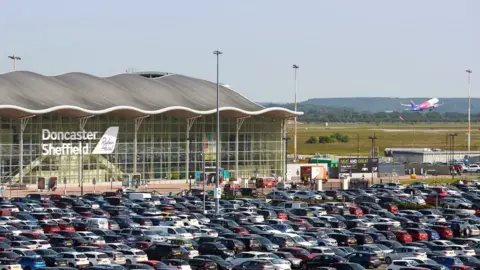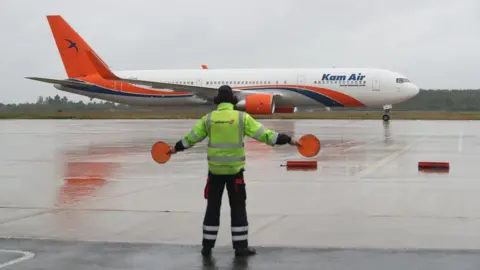Doncaster Sheffield Airport: Airspace to be downgraded
 Doncaster Sheffield Airport
Doncaster Sheffield AirportThe airspace around Doncaster Sheffield Airport is to be downgraded as part of the winding down process at the site.
The airport will not provide air traffic control services from 3 December after halting passenger flights last month.
The surrounding airspace would still be open to air traffic, however it would not be managed, documents from the Civil Aviation Authority (CAA) show.
A CAA spokesperson said it would revert to being "uncontrolled" space.
Site owner Peel ended commercial passenger flights in November, citing the "financial viability" of the airport.
An application for a judicial review of the airport closure was refused earlier this week.
The area around the airport had previously been categorised as Class D airspace, meaning pilots would have to speak to controllers for permission to fly in the zone.
This was aimed at keeping private pilots and commercial airliners a safe distance apart around the immediate area of the airport.
That zone would now be be lifted and would instead become Class G airspace, which allowed pilots to fly almost anywhere they liked and were responsible for their own safety, air traffic control company NATS said.
 PA Media
PA MediaThe recategorisation comes as fewer large aircraft are expected to be in the area following the closure of the airport.
The managed air space would close unless another air traffic control provider came forward before 17 February 2023, otherwise it would change on 18 May, the CAA said.
The decision to stop the airspace changing had been paused while the judicial review was decided, but had since continued.
The CAA spokesperson said: "Doncaster Sheffield Airport has already notified airspace users it will cease to provide air traffic services and therefore does not require the controlled airspace that was previously used to support its operations.
"This airspace will therefore revert to being 'uncontrolled' airspace while we undertake a permanent airspace change process."
They added: "This process will allow us to safely manage the withdrawal of the controlled airspace structures as we review the use of that airspace."

Follow BBC Yorkshire on Facebook, Twitter and Instagram. Send your story ideas to [email protected].
